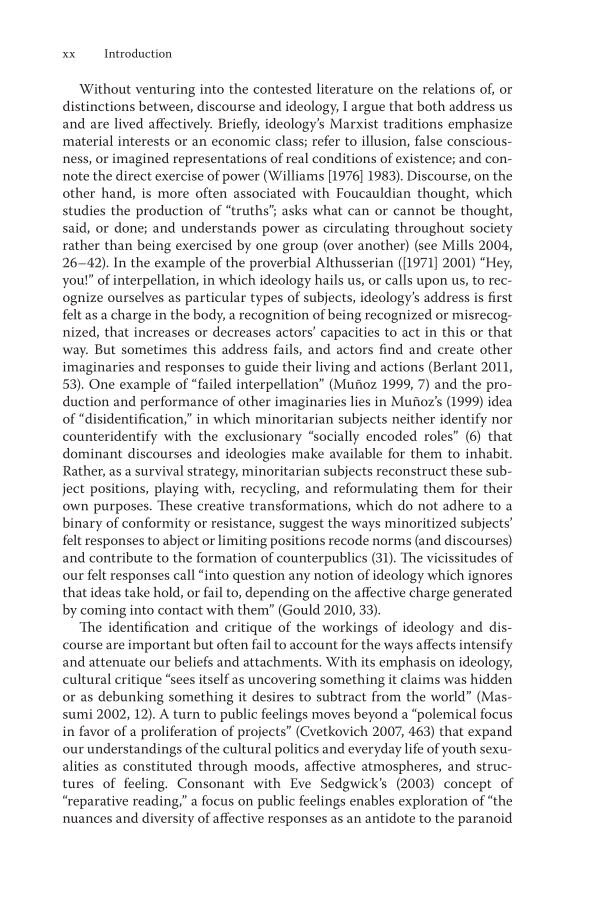xx Introduction Without venturing into the contested literature on the relations of, or distinctions between, discourse and ideology, I argue that both address us and are lived affectively. Briefly, ideology’s Marxist traditions emphasize material interests or an economic class refer to illusion, false conscious- ness, or imagined representations of real conditions of existence and con- note the direct exercise of power (Williams [1976] 1983). Discourse, on the other hand, is more often associated with Foucauldian thought, which studies the production of “truths” asks what can or cannot be thought, said, or done and understands power as circulating throughout society rather than being exercised by one group (over another) (see Mills 2004, 26–42). In the example of the proverbial Althusserian ([1971] 2001) “Hey, you!” of interpellation, in which ideology hails us, or calls upon us, to rec- ognize ourselves as particular types of subjects, ideology’s address is first felt as a charge in the body, a recognition of being recognized or misrecog- nized, that increases or decreases actors’ capacities to act in this or that way. But sometimes this address fails, and actors find and create other imaginaries and responses to guide their living and actions (Berlant 2011, 53). One example of “failed interpellation” (Muñoz 1999, 7) and the pro- duction and performance of other imaginaries lies in Muñoz’s (1999) idea of “disidentification,” in which minoritarian subjects neither identify nor counteridentify with the exclusionary “socially encoded roles” (6) that dominant discourses and ideologies make available for them to inhabit. Rather, as a survival strategy, minoritarian subjects reconstruct these sub- ject positions, playing with, recycling, and reformulating them for their own purposes. These creative transformations, which do not adhere to a binary of conformity or resistance, suggest the ways minoritized subjects’ felt responses to abject or limiting positions recode norms (and discourses) and contribute to the formation of counterpublics (31). The vicissitudes of our felt responses call “into question any notion of ideology which ignores that ideas take hold, or fail to, depending on the affective charge generated by coming into contact with them” (Gould 2010, 33). The identification and critique of the workings of ideology and dis- course are important but often fail to account for the ways affects intensify and attenuate our beliefs and attachments. With its emphasis on ideology, cultural critique “sees itself as uncovering something it claims was hidden or as debunking something it desires to subtract from the world” (Mas- sumi 2002, 12). A turn to public feelings moves beyond a “polemical focus in favor of a proliferation of projects” (Cvetkovich 2007, 463) that expand our understandings of the cultural politics and everyday life of youth sexu- alities as constituted through moods, affective atmospheres, and struc- tures of feeling. Consonant with Eve Sedgwick’s (2003) concept of “reparative reading,” a focus on public feelings enables exploration of “the nuances and diversity of affective responses as an antidote to the paranoid
Document Details My Account Print multiple pages
Print
You have printed 0 times in the last 24 hours.
Your print count will reset on at .
You may print 0 more time(s) before then.
You may print a maximum of 0 pages at a time.
















































































































































































































































































































































































































































































































































































































